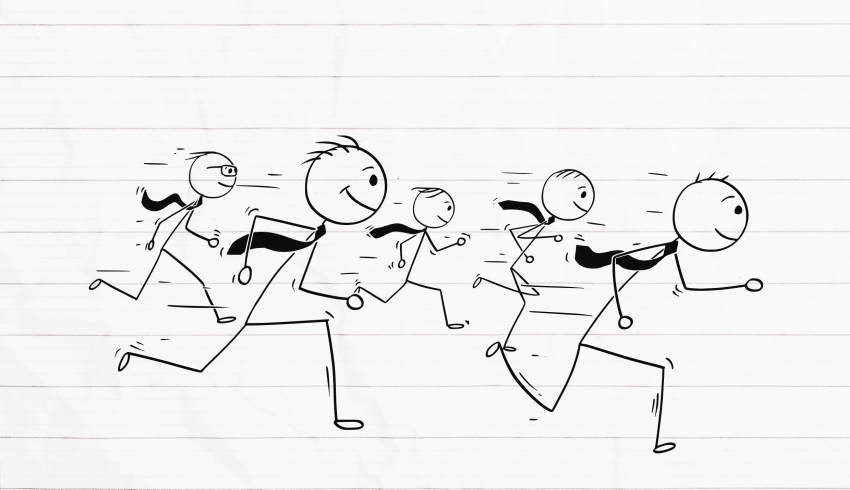Early career teachers – Advice for ECTs and those leading them

Whether you’re leading ECTs or are one yourself, these experts have got spot-on advice for you…

- by Teachwire
- Classroom expertise and free resources for teachers

Thriving as an early career teacher requires willing and balance. Teaching is a journey that requires continuous growth.
There will be challenges along the way, but embracing and learning from them – whilst not forgetting to also celebrate the successes – will lead to a career where you’re not just surviving, but thriving.
Surviving and thriving as an early career teacher
Meet and greet
See as many people as you can. Whatever your route into teaching, training often involves observations of teachers in and out of your subject specialism.
This will usually be your first opportunity to see teaching and learning in action, and form ideas about the type of teacher you wish to become.
However, once you’ve qualified and commenced a full teaching timetable, it’s common for these lesson observation opportunities to reduce significantly.
In fact, it’s conceivable that many early career teachers will rarely leave their own classrooms – yet the benefits of getting out to see others teach are considerable. These include, but aren’t limited to:
- Reassurance – Observing others can provide you with peace of mind that the issues you might be facing are common, and that even more experienced teachers need to navigate similar challenges.
- Targeted professional development – When struggling with a specific issue, it’s good to observe colleagues who are strong in that area. If you’re unsure who to observe, seek advice from a mentor or line manager who can guide you. Observing with a specific development focus in mind can provide practical strategies for you to trial in your own classroom.
- Idea generation – It’s easy to become comfortable in your own routines as a teacher; observing others can provide that spark or moment of inspiration for you to advance your teaching, ensuring that student engagement doesn’t dwindle.
Observing colleagues in any area of the school, regardless of discipline or age taught, can be beneficial. Take time afterwards to reflect on what you’ve observed and how it might change your teaching.
Check the evidence
Ground your pedagogy in research. As an early career teacher, it’s likely that you’ll have been exposed to anecdotal tales of great teaching by others considerably more experienced than yourself.
Whilst there can be some contextual value in this information, a research-informed approach is a more rigorous approach to developing pedagogy.
Early career teachers will often begin their careers in teaching with a good foundation of theory, but soon become disconnected from academic research once they’ve qualified.
Online media can provide an effective way of re-engaging with this evidence base, through listening to podcasts, using platforms like Google Scholar and utilising AI to locate and summarise literature.
Staying connected to research will, firstly, reduce the challenges of re-engaging and ensure that you make informed decisions regarding your pedagogical approaches.
Likewise, when you have a specific concern with your practice, or would like to develop a particular area, utilising an Action Research approach – whereby you implement evidence-based strategies, evaluate their success, review and then redevelop – can help you maintain a strategic focus.
Improve your subject knowledge
Strong subject knowledge developed throughout one’s career is a fundamental building block of effective teaching.
Teaching is a profession that’s constantly evolving; having a strong knowledge base to draw from will enable you to avoid misconceptions and answer questions that fall outside of the planned curriculum.
Attending subject-specific courses and conferences is a great way of developing your subject knowledge, and can facilitate networking with like-minded colleagues.
Likewise, joining professional associations and engaging with online communities can also be hugely beneficial.
Staying focused on the content of what you’re teaching in your personal reading, and keeping up with contemporary news regarding the topics you’re engaging with, will help ensure that your disciplinary knowledge remains up to date, and that you retain your passion for the content you’re teaching.
Cast your net wide
Building professional networks both within and beyond your setting is another important facet of thriving as an early career teacher.
Surrounding yourself with supportive and positive colleagues can be beneficial in both a professional and personal sense, and significantly contribute to your success as a teacher.
Colleagues are a valuable source of information and advice, and are naturally essential for any collaborative approaches to work.
Developing these kinds of professional working relationships early on will provide you with a support network that can generate positivity across the profession at large, and help to reduce any sense of isolation you may be feeling.
Every teacher has bad days. Having colleagues you can turn to for moral support and advice when you’re struggling can be key to staying in teaching for the long-term.
There is, however, a caveat here. Positive networks can be hugely empowering, but do be mindful how insidious toxic relationships can be.
Should you ever find yourself in a group whose members are all jaded with respect to the profession and see everything through a lens of negativity, it may be worth challenging them, or else moving on to a different group altogether.
Invest in your wellbeing
Develop your own ‘reset button’. Teaching is a demanding profession, and can be all-consuming if you’re not careful.
Investing in yourself professionally is important – but so too is investing in your wellbeing. Setting clear boundaries between work and personal time is a routine that we’d recommend you establish as soon as possible.
A teacher’s workload is never-ending. And yes, while you do need to ensure deadlines are being met, it’s just as vital that you feel capable of flicking the ‘off’ switch, without feeling guilty.
The ability to practice self-care is an important element of your overall wellbeing. You’ll be more effective in the classroom if you ensure that you look after yourself, both physically and mentally.
Maintaining regular exercise, a healthy diet and ensuring you get sufficient sleep each night are all important for ensuring your students get the best of you in the classroom.
Seek out support
It’s also crucial to actively seek out support and advice whenever you might need it. Through those strong professional relationships you’ve already established, you’ll have a support network that’s ready and willing to help.
One certainty in teaching is that things will go wrong from time to time – so when they do, talk things through and come up with new approaches and solutions.
You can then embark on the next day knowing that this is normal, and that each day can be an opportunity for you to refine your practice and grow professionally.
Geoff Baker is a Professor of Education and Craig Lomas is a Senior Lecturer in Education, both at the University of Bolton. They are both former senior secondary school leaders.
How leaders can stop early career teachers getting overwhelmed
Make sure you’re not the kind of school leader who leaves their early career teachers to fend for themselves, urges Dr Chris Baker…
Each year, thousands of teachers will commence their first role in the profession as early career teachers at new schools.
Sadly, each year will also see thousands of early career teachers spend those first few weeks in a haze of confusion and dented confidence.
If they want to do the best by their staff and students, school leaders must therefore proactively seek to soften the impact of that inevitable drop in confidence that takes hold every September.
The self-efficacy lull
Confidence is a powerful thing, and often the unconscious driving force behind our thoughts, feelings, motivations and actions. Our levels of task-specific confidence – or ‘self-efficacy’, as the literature would have it – will help to either push us towards, or pull us away from starting tasks and challenges. It moderates how much effort we apply, and guides us in either persisting or giving up in the face of adversity.
The godfather of self-efficacy is Albert Bandura. His work highlighted how our perceived levels of task-specific confidence are extremely dynamic. They fluctuate almost constantly, due to past experiences, comparisons with others and social or internal persuasion.
Faced with a completing set of algebraic equations or a 10k run, we’ll seek out ‘evidence’ to decide how confident we feel. Have we been successful at such tasks before? Have we seen others similar to us be successful? Is there anyone else – or own internal voice – telling us we can or can’t succeed?
Changes to our context can also have an impact. Early career teachers taking up their first post will almost always experience a dip in their confidence that we could call a ‘self-efficacy lull’.
If unrecognised and unresolved, these lulls could cause otherwise capable early career teachers to doubt their abilities, second-guess their decision making and lower their expectations.
The good news, however, is that leaders can proactively reduce the impact of these lulls by focusing on two key areas:
Trending
- ensuring that ECTs have clear mental models
- making sure ECTs feel psychologically safe
Mental models
Mental models are our personal representations of what things are and how they work. Peps Mccrea’s work on ‘developing expert teaching’ suggests that these mental models typically drive how we behave. This then has a direct influence on our impact and effectiveness.
If our mental model of something like feedback is accurate, we can use that clarity to ensure we perform feedback tasks correctly. This in turn should then lead to the desired impact.
Unfortunately, the opposite is also true. If you’re like me, you can track many of your past mistakes back to a lack of understanding – or in other words, an inaccurate mental model.
ECTs have two major mental model challenges to overcome. They will have formed existing models during their training year which may not be accurate. And they will have a complete absence of any models for the school-specific systems, processes and behaviours they’re about to experience.
School leaders must therefore invest significant time into an ECT induction process. This should go beyond the provision of a school handbook and a tour of the reprographics room, and into a much deeper exploration of understanding.
ECTs should have complete clarity around school systems and processes. This includes attendance, behaviour, reporting and everything else they’ll be expected to utilise and be evaluated on.
Differing experiences of early career teachers
Leaders mustn’t assume that all ECTs are created the same. The reality is that their training experiences will vary greatly. Their understanding of effective teaching and learning may also differ.
Less glamorous than pedagogy, but equally important to ECT clarity and effectiveness are the expectations around staff conduct. Leaders can’t justifiably challenge behaviours that haven’t been fully explained. Elements such as directed time, communication protocols, line management structures and even dress code shouldn’t be left to osmosis.
Leaders who devote time to exploring and refining ECT mental models will be investing in not just their relationships with those teachers, but also the learning experiences of their students.
Psychological safety
The complexity of schools and the pace of early September means that even with the best induction process, there could still be a residual amount of confusion for ECTs and inaccuracies in their mental models.
This means it’s important that leaders create an environment in which ECTs are able to feel vulnerable. One where they’re free to seek out answers to any lingering questions.
This sense that one won’t be punished or humiliated for expressing ideas, questions, concerns, or mistakes is termed ‘psychological safety’. It has been shown to be a significant factor in the success of many teams and organisations.
Amy Edmondson’s work on this topic shows that when leaders get it right, they can dramatically increase feelings of belonging, inclusion and authenticity among their staff. This leads to greater levels of engagement, motivation and commitment.
“When leaders get it right, they can dramatically increase feelings of belonging, inclusion and authenticity among their staff”
Getting it wrong results in environments where staff feel they need to self-censor and hold back from being their true selves. Confusion lingers, with questions going unasked. Good ideas never make it to the table and ineffective practices persist due to lack of any challenge.
I expect we’ve all previously been in psychologically unsafe situations where a leader proposes a plan of action and receives what looks like an approving silence from their audience. That idea is then picked apart once individuals are out of the meeting and back within the safety of their peer group.
Creating the culture
ECTs are in both a challenging and privileged position when it comes to psychological safety. Their newness to the school may initially lead them to self-censor, as they don’t want to seem weak, needy or bother people.
But at the same time, it’s that very newness that gives them licence to ask lots of questions.
The challenge for leaders is to not passively allow the inevitable variation in ECT safety to govern those first few weeks of September.
To create psychologically safe environments, leaders must clearly communicate:
- a desire for honesty
- an openness to curiosity
- their own fallibility
They need to create a culture and set up processes that enable them to catch and correct misconceptions before they can have a negative impact. They also need to celebrate those who bravely decide to ask questions, put forward ideas or present an alternative points of view.
Leaders who do this successfully will double down on the relationships generated through complete clarity. They’ll also magnify the subsequent impact on their students and the school as whole.
- Speak last
Listen to others before adding your input; going first may lead others to self-censor because their views don’t match. - Propose provisionally
Always leave room for discussion and alternative viewpoints,
- Model vulnerability
Recount personal mistakes or times of confusion so others can follow.
- Regularly reset permissions
Remind staff about your desire for honesty and the importance of psychological safety.
- Celebrate vulnerability
Praise those who suggest, question and challenge.
- Fail forward
Treat mistakes as stepping stones to further improvements and innovation.
Dr Chris Baker is leader of professional development at the Cabot Learning Federation
Advice for your first year as an Early Career Teacher

If you’re a fledgling teacher still getting to grips with what the job entails, John Lawson would like a word…
My target audience today is the resourceful Early Career Teacher cohort who have managed to survive the immense challenge of complex studies, teaching practice, interviews and so much more.
Welcome to the wonderful, life-changing world of teaching. Allow me to make a few noises that may help you.
First off, be true to yourself. You’ll never connect with your students if you adopt a teaching persona based on someone you admire. What fits them superbly may never suit you.
Teenagers are like animals – some of them wild, others less so, but all driven by acute sensory perception. They can instantly sense when something is amiss about Miss or Sir, and they’re skilled trackers.
If you want to ace their sniff test, stand your ground, maintain eye contact, smile and let them see someone confident, knowledgeable, and passionate about their subject. The more you love to teach, the more your students will love to learn. Great teachers always assume they’re teaching great subjects.
“The more you love to teach, the more your students will love to learn”
Embers of autonomy
Teach as you can, and not as you can’t. No two teachers will shape any syllabus in quite the same way; indeed, variety is the spice of classroom life. The way that works for you is always the best way to teach. You must adhere to the aims and objectives of the course – but the rest is your call, which is where the profession’s remaining embers of autonomy and agency will be warmest.
Every principal’s primary concern about the teachers they oversee will be, ‘Can they deliver the goods?’ I once took over a supposedly ‘unteachable’ bottom set Y11 RE class, and had just two terms to get them through their GCSEs after the school had all but given up on them. This was a ‘mission impossible’ that called for an unorthodox, even risky approach.
I therefore promised the students that if they let me teach uninterrupted for 20 minutes each day, they could have the other 30 minutes to themselves. I saw this as being 20 quality minutes gained, rather than 30 minutes lost.
Every night I prepared a 10-point handout to teach from. Teenagers can behave and concentrate for 20 minutes, providing the incentives are appealing. Once their free time commenced, the various social groups in the class would play cards, listen to music or quietly chat.
From my point of view, enjoying the craic and being high-fives-friendly was better than risking a bunch of fives. They respected me as a friendly and ‘brainy dude’, but I was never a mere friend. 12 of my ‘disciples’ went on to diligently earn a C in RE, and I’ve often wondered how they explained their sole GCSE to their own children…
Discipline and punishment
Ludwig Wittgenstein’s sharpest contribution to education was his conclusion that we cannot accurately read students’ minds. This is why it’s so important to focus on delivering high quality teaching by avoiding the simple relaying of facts, when raising questions is more engaging.
For example, instead of just asserting ‘Racism, sexism, and homophobia are indefensible,’ turn this round by asking them ‘How do we know that racism, sexism, and homophobia are indefensible?’ The concentration span of teenagers peaks when you let them speak, and they love discovering answers!
“The concentration span of teenagers peaks when you let them speak”
Discern the difference between discipline and punishment as soon as you can, and avoid shouting – it never helps. Effective disciplinary responses to unwanted behaviour are those that educate teenagers out of poor conduct.
Teachers must also model and foster respectful behaviour. Once you’ve created a healthy, fear-free learning environment, everything else falls into place. Most detentions are pointless unless they truly educate the detained.
Mutual respect
Don’t sweat the small stuff. New teachers invariably face challenges to their authority, but when you encounter behaviour that doesn’t prevent the majority from learning, let it pass. However, you must never let any form of abuse or aggression slide. The more you tolerate, the more you’ll have to tolerate in future.
Prioritise disciplinary actions over the curriculum, and calmly address situations as privately as possible. Lost time can be quickly made up once student behaviour improves. Respect is a two-way street, so respecting your students is a categorical imperative.
Finally, read Parker J Palmer’s brilliant polemic, The Courage to Teach, and if you haven’t already, watch Freedom Writers, Dead Poets Society and Stand and Deliver – a set of outstanding works that all identify and celebrate inspirational teaching.
John Lawson is a former secondary teacher, now serving as a foundation governor while running a tutoring service, and author of the book The Successful (Less Stressful) Student (Outskirts Press, £11.95); find out more at prep4successnow.wordpress.com or follow @johninpompano










